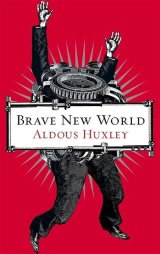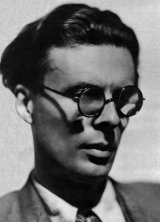Brave New World Page #4
Odd, original and irreverent, Aldous Huxley's tour de force is a darkly satiric vision of a "utopian" future --where humans are genetically bred and pharmaceutically anesthetized to passively serve a ruling order. A powerful and thought-provoking classic of speculative fiction, Brave New World is entertaining, fascinating, and terrifying all at the same time and remains remarkably relevant to this day as a warning to be heeded as we head into tomorrow.
"And that," put in the Director sententiously, "that is the secret of happiness and virtue–liking what you've got to do. All conditioning aims at that: making people like their unescapable social destiny." In a gap between two tunnels, a nurse was delicately probing with a long fine syringe into the gelatinous contents of a passing bottle. The students and their guides stood watching her for a few moments in silence. "Well, Lenina," said Mr. Foster, when at last she withdrew the syringe and straightened herself up. The girl turned with a start. One could see that, for all the lupus and the purple eyes, she was uncommonly pretty. "Henry!" Her smile flashed redly at him–a row of coral teeth. "Charming, charming," murmured the Director and, giving her two or three little pats, received in exchange a rather deferential smile for himself. "What are you giving them?" asked Mr. Foster, making his tone very professional. "Oh, the usual typhoid and sleeping sickness." "Tropical workers start being inoculated at Metre 150," Mr. Foster explained to the students. "The embryos still have gills. We immunize the fish against the future man's diseases." Then, turning back to Lenina, "Ten to five on the roof this afternoon," he said, "as usual." "Charming," said the Director once more, and, with a final pat, moved away after the others. On Rack 10 rows of next generation's chemical workers were being trained in the toleration of lead, caustic soda, tar, chlorine. The first of a batch of two hundred and fifty embryonic rocket-plane engineers was just passing the eleven hundred metre mark on Rack 3. A special mechanism kept their containers in constant rotation. "To improve their sense of balance," Mr. Foster explained. "Doing repairs on the outside of a rocket in mid-air is a ticklish job. We slacken off the circulation when they're right way up, so that they're half starved, and double the flow of surrogate when they're upside down. They learn to associate topsy-turvydom with well-being; in fact, they're only truly happy when they're standing on their heads. "And now," Mr. Foster went on, "I'd like to show you some very interesting conditioning for Alpha Plus Intellectuals. We have a big batch of them on Rack 5. First Gallery level," he called to two boys who had started to go down to the ground floor. "They're round about Metre 900," he explained. "You can't really do any useful intellectual conditioning till the foetuses have lost their tails. Follow me." But the Director had looked at his watch. "Ten to three," he said. "No time for the intellectual embryos, I'm afraid. We must go up to the Nurseries before the children have finished their afternoon sleep." Mr. Foster was disappointed. "At least one glance at the Decanting Room," he pleaded. "Very well then." The Director smiled indulgently. "Just one glance." Chapter Two MR. FOSTER was left in the Decanting Room. The D.H.C. and his students stepped into the nearest lift and were carried up to the fifth floor. INFANT NURSERIES. NEO-PAVLOVIAN CONDITIONING ROOMS, announced the notice board. The Director opened a door. They were in a large bare room, very bright and sunny; for the whole of the southern wall was a single window. Half a dozen nurses, trousered and jacketed in the regulation white viscose-linen uniform, their hair aseptically hidden under white caps, were engaged in setting out bowls of roses in a long row across the floor. Big bowls, packed tight with blossom. Thousands of petals, ripe-blown and silkily smooth, like the cheeks of innumerable little cherubs, but of cherubs, in that bright light, not exclusively pink and Aryan, but also luminously Chinese, also Mexican, also apoplectic with too much blowing of celestial trumpets, also pale as death, pale with the posthumous whiteness of marble. The nurses stiffened to attention as the D.H.C. came in. "Set out the books," he said curtly. In silence the nurses obeyed his command. Between the rose bowls the books were duly set out–a row of nursery quartos opened invitingly each at some gaily coloured image of beast or fish or bird. "Now bring in the children." They hurried out of the room and returned in a minute or two, each pushing a kind of tall dumb-waiter laden, on all its four wire-netted shelves, with eight-month-old babies, all exactly alike (a Bokanovsky Group, it was evident) and all (since their caste was Delta) dressed in khaki. "Put them down on the floor." The infants were unloaded. "Now turn them so that they can see the flowers and books." Turned, the babies at once fell silent, then began to crawl towards those clusters of sleek colours, those shapes so gay and brilliant on the white pages. As they approached, the sun came out of a momentary eclipse behind a cloud. The roses flamed up as though with a sudden passion from within; a new and profound significance seemed to suffuse the shining pages of the books. From the ranks of the crawling babies came little squeals of excitement, gurgles and twitterings of pleasure. The Director rubbed his hands. "Excellent!" he said. "It might almost have been done on purpose." The swiftest crawlers were already at their goal. Small hands reached out uncertainly, touched, grasped, unpetaling the transfigured roses, crumpling the illuminated pages of the books. The Director waited until all were happily busy. Then, "Watch carefully," he said. And, lifting his hand, he gave the signal. The Head Nurse, who was standing by a switchboard at the other end of the room, pressed down a little lever. There was a violent explosion. Shriller and ever shriller, a siren shrieked. Alarm bells maddeningly sounded. The children started, screamed; their faces were distorted with terror. "And now," the Director shouted (for the noise was deafening), "now we proceed to rub in the lesson with a mild electric shock." He waved his hand again, and the Head Nurse pressed a second lever. The screaming of the babies suddenly changed its tone. There was something desperate, almost insane, about the sharp spasmodic yelps to which they now gave utterance. Their little bodies twitched and stiffened; their limbs moved jerkily as if to the tug of unseen wires. "We can electrify that whole strip of floor," bawled the Director in explanation. "But that's enough," he signalled to the nurse. The explosions ceased, the bells stopped ringing, the shriek of the siren died down from tone to tone into silence. The stiffly twitching bodies relaxed, and what had become the sob and yelp of infant maniacs broadened out once more into a normal howl of ordinary terror. "Offer them the flowers and the books again." The nurses obeyed; but at the approach of the roses, at the mere sight of those gaily-coloured images of pussy and cock-a-doodle-doo and baa-baa black sheep, the infants shrank away in horror, the volume of their howling suddenly increased.
Translation
Translate and read this book in other languages:
Select another language:
- - Select -
- 简体中文 (Chinese - Simplified)
- 繁體中文 (Chinese - Traditional)
- Español (Spanish)
- Esperanto (Esperanto)
- 日本語 (Japanese)
- Português (Portuguese)
- Deutsch (German)
- العربية (Arabic)
- Français (French)
- Русский (Russian)
- ಕನ್ನಡ (Kannada)
- 한국어 (Korean)
- עברית (Hebrew)
- Gaeilge (Irish)
- Українська (Ukrainian)
- اردو (Urdu)
- Magyar (Hungarian)
- मानक हिन्दी (Hindi)
- Indonesia (Indonesian)
- Italiano (Italian)
- தமிழ் (Tamil)
- Türkçe (Turkish)
- తెలుగు (Telugu)
- ภาษาไทย (Thai)
- Tiếng Việt (Vietnamese)
- Čeština (Czech)
- Polski (Polish)
- Bahasa Indonesia (Indonesian)
- Românește (Romanian)
- Nederlands (Dutch)
- Ελληνικά (Greek)
- Latinum (Latin)
- Svenska (Swedish)
- Dansk (Danish)
- Suomi (Finnish)
- فارسی (Persian)
- ייִדיש (Yiddish)
- հայերեն (Armenian)
- Norsk (Norwegian)
- English (English)
Citation
Use the citation below to add this book to your bibliography:
Style:MLAChicagoAPA
"Brave New World Books." Literature.com. STANDS4 LLC, 2025. Web. 22 Feb. 2025. <https://www.literature.com/book/brave_new_world_2066>.








Discuss this Brave New World book with the community:
Report Comment
We're doing our best to make sure our content is useful, accurate and safe.
If by any chance you spot an inappropriate comment while navigating through our website please use this form to let us know, and we'll take care of it shortly.
Attachment
You need to be logged in to favorite.
Log In